Learn about Senior Husky Diet and Nutrition Guide for Prospective Owners for proper care of husky pets.
| Caloric Needs | Senior Huskies generally require fewer calories, ranging from 1,100 to 1,400 per day, depending on their size and activity level. |
| Protein Requirements | High-quality protein should make up at least 18% of their diet to maintain muscle mass. |
| Fat Content | Fat should be reduced to around 5-10% of their diet to prevent obesity and support metabolic functions. |
| Carbohydrate Choices | Complex carbohydrates like brown rice and vegetables support sustained energy and digestive health. |
| Meal Frequency | Senior Huskies often benefit from 2 smaller meals per day instead of one large meal. |
| Essential Fatty Acids | Omega-3 and Omega-6 fatty acids are vital for joint health and cognitive function. |
| Supplements | Glucosamine and chondroitin supplements can be beneficial for joint support. |
| Hydration | Senior Huskies should always have access to fresh water, consuming around 1 ounce per pound of body weight daily. |
| Weight Monitoring | Maintaining an ideal weight is critical; obesity can lead to health complications like diabetes and heart disease. |
| Diet Adjustment | Diet and nutrition needs should be adjusted based on the health, weight, and activity changes in senior Huskies. |
Regular veterinary checkups are an essential aspect of the Senior Husky Diet and Nutrition Guide for Prospective Owners. These checkups play a crucial role in assessing your senior husky’s overall health and determining specific nutritional needs based on individual health assessments.
They provide valuable insights into any underlying medical conditions or age-related issues that may impact your husky’s dietary requirements, allowing you to make informed decisions about their diet and nutritional intake.
Senior Husky Diet and Nutrition Guide for Prospective Owners
Veterinary checkups help in understanding the unique health profile of your senior husky, enabling you to tailor their diet to meet their specific needs.
To delve further into the well-being of your furry friends, explore our comprehensive guide for maintaining your Husky's comfort in warmer climates. Learn the critical steps for safeguarding their health with our article, Essential Tips for Proper Husky Care During Hot Weather.
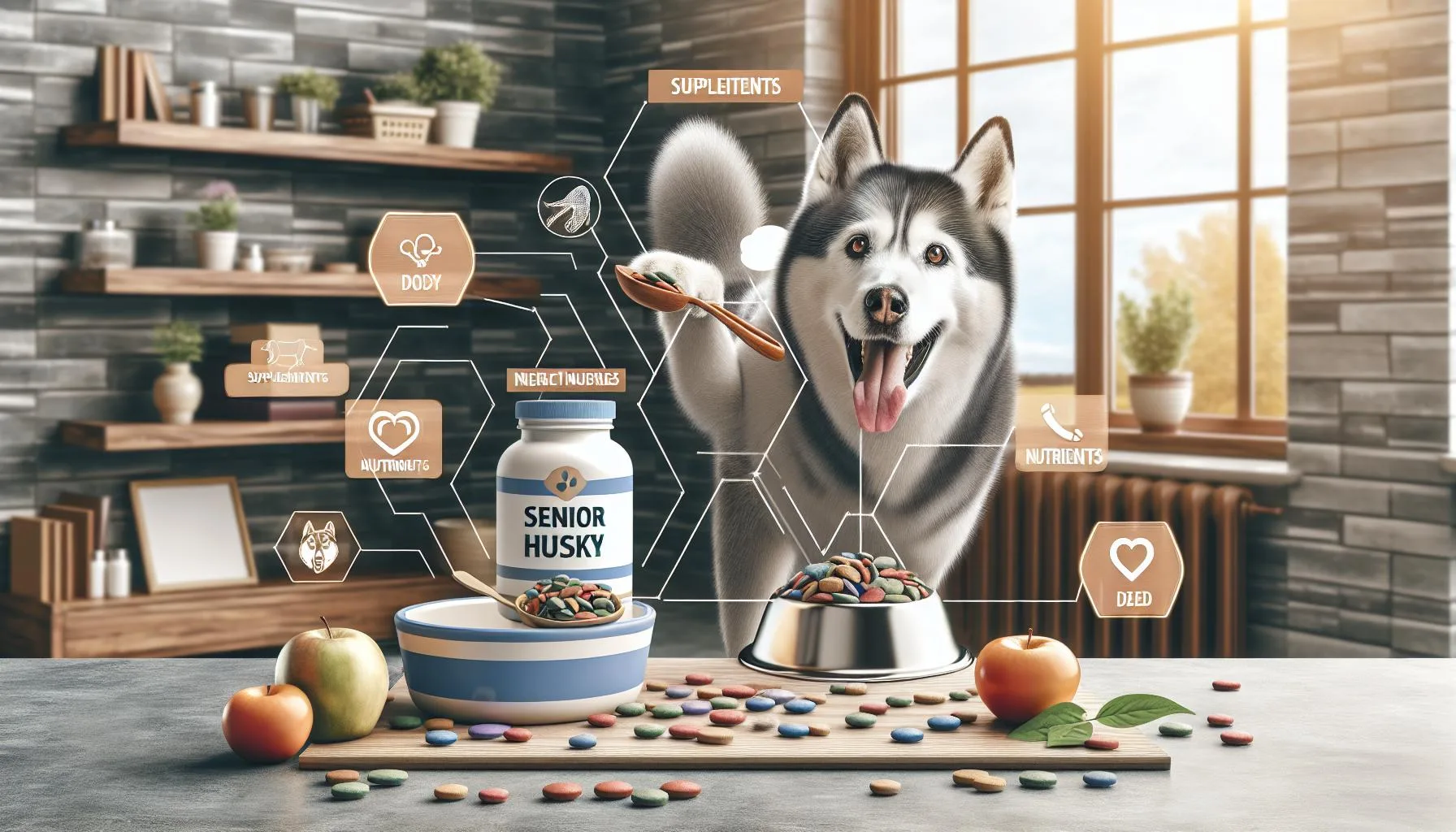
Weight Management in Senior Huskies
Senior Husky Diet and Nutrition Guide for Prospective Owners
As a pet owner, it’s crucial to address the common issues of weight gain in aging Huskies, and manage their diet accordingly to maintain optimal weight. Senior Husky Diet and Nutrition Guide for Prospective Owners is an essential tool in helping your aging pet stay healthy. Proper weight management for senior Huskies involves monitoring their calorie intake and portion sizes.
It’s important to ensure that they are getting the right amount of nutrients without overfeeding, which could lead to weight gain. Additionally, regular exercise is key to maintaining a healthy weight in senior Huskies. It’s essential to consult with a veterinarian to determine the appropriate calorie intake for your senior Husky, taking into account any health conditions or specific dietary needs.
By providing a well-balanced diet and incorporating regular exercise, you can help your senior Husky maintain an optimal weight and overall well-being for a happy and active lifestyle..
Understanding how to manage your Husky's diet is just the beginning; a well-maintained weight is crucial for their overall longevity. Dive deeper into the lifespan of these resilient dogs and learn how you can help them thrive by reading our detailed guide on the life expectancy of Huskies.

The Role of Protein in a Senior Husky's Diet
Protein plays a crucial role in a Senior Husky Diet and Nutrition Guide for Prospective Owners. As a Husky ages, its protein needs evolve to support muscle maintenance and overall health.
High-quality protein sources, such as lean meats or fish, are essential for sustaining muscle mass and function in senior Huskies. Additionally, adequate protein intake aids in the body’s repair processes, supporting joint health and mobility.
It’s important for prospective owners to understand that the protein requirements for senior Huskies may differ from those of younger dogs, making it essential to tailor their diet accordingly to ensure they receive the optimal amount of this vital nutrient.
Senior Husky Diet and Nutrition Guide for Prospective Owners
Increased protein intake in the diet of senior Huskies can also aid in weight management, as it helps maintain lean muscle mass, supporting a healthy metabolism and preventing the onset of obesity. Moreover, protein-rich diets can contribute to improved immune function and overall vitality, promoting a better quality of life for aging Huskies.
Therefore, when constructing a diet plan for a senior Husky, prospective owners should prioritize the inclusion of high-quality proteins to meet their specific needs, ensuring their well-being and longevity.
As senior Huskies require tailored nutrition for muscle preservation, understanding their dietary evolution is crucial. Discover additional insights and practical tips on managing your aging Husky's well-being by exploring our in-depth guide, "Shedding Light on Husky Care and Nutrition". Shedding Light on Husky Care and Nutrition.

Balancing Fats and Carbohydrates
A Senior Husky Diet and Nutrition Guide for Prospective Owners emphasizes the significance of striking a balance between fats and carbohydrates to maintain optimal energy levels and prevent obesity in aging Huskies. Both fats and carbohydrates play essential roles in providing energy, with fats serving as a concentrated source of energy and carbohydrates as a readily available energy source.
However, it’s crucial to ensure that the proportions of fats and carbohydrates in the diet align with the specific energy requirements and activity levels of senior Huskies to prevent weight gain and maintain their overall well-being.
For senior Huskies, incorporating high-quality fats, such as Omega-3 fatty acids, is beneficial for supporting joint health and maintaining a healthy coat. Meanwhile, carbohydrates should primarily be sourced from wholesome sources like fruits, vegetables, and whole grains to provide fiber for digestion and sustained energy.
As aging dogs may have a lower metabolism, careful attention to the overall calorie intake from fats and carbohydrates is essential to prevent excess weight gain while still meeting their energy requirements.
Understanding the balance between fats and carbohydrates is crucial for maintaining energy and preventing obesity. For insight into how dietary choices impact the growth of different species, delve into our detailed exploration on the growth patterns and weight ranges for huskies.
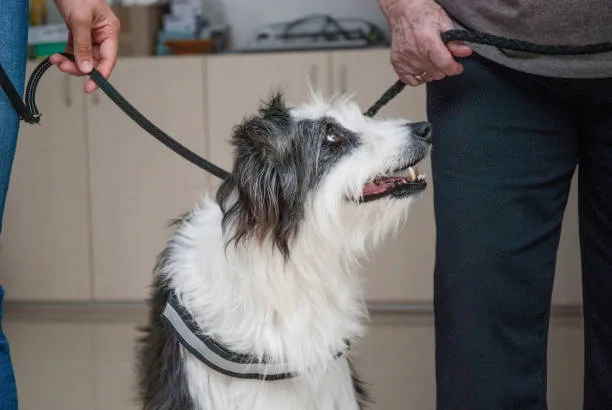
Vitamins and Supplements for Aging Huskies
Senior Husky Diet and Nutrition Guide for Prospective Owners should include necessary vitamins and supplements to support the health of aging Huskies. Some essential vitamins and supplements for senior Huskies include:
- Omega-3 Fatty Acids: These are beneficial for maintaining joint health and reducing inflammation, especially important for senior Huskies prone to arthritis.
- Glucosamine and Chondroitin: These supplements help support joint function and may alleviate age-related stiffness and discomfort.
- Probiotics: Supporting digestive health is crucial for senior Huskies, and probiotics can aid in maintaining a healthy gut flora.
- Antioxidants: Including vitamins C and E can help neutralize free radicals and support the immune system in aging Huskies.
It’s important to consult with a veterinarian before adding any vitamins or supplements to a senior Husky’s diet.
The vet can provide guidance on the appropriate dosages and which supplements are most beneficial based on the individual dog’s health needs. Additionally, it’s essential to select high-quality supplements formulated specifically for dogs to ensure their safety and effectiveness.
By understanding the role of vitamins and supplements in a senior Husky’s diet, prospective owners can take proactive steps to support their pet’s overall health and well-being in their golden years.
Once you've ensured that your senior Husky's dietary needs are met, you might also want to explore ways to keep them calm and content. Discover a variety of positive techniques to soothe an energetic Husky by reading our latest article on calming strategies for Huskies.
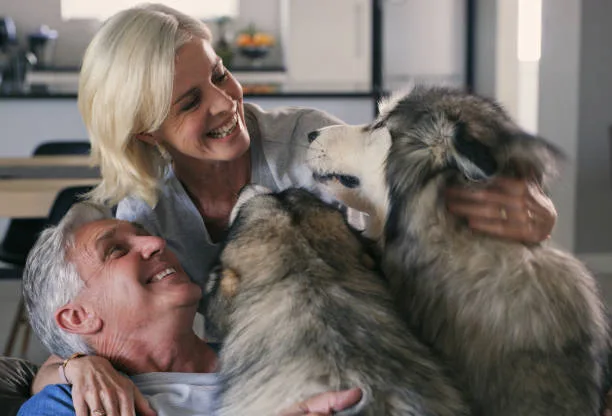
Managing Joint Health Through Nutrition
As a part of the Senior Husky Diet and Nutrition Guide for Prospective Owners, it’s important to understand how diet plays a crucial role in managing joint health for aging Huskies. Proper nutrition can significantly influence joint health and alleviate issues related to arthritis and mobility.
Including nutrients such as Omega-3 fatty acids, glucosamine, and chondroitin in the senior Husky’s diet can promote joint flexibility, reduce inflammation, and support overall mobility. These nutrients aid in maintaining the structural integrity of the joints, thus ensuring that senior Huskies can enjoy an active and comfortable lifestyle for years to come.
Furthermore, a diet rich in antioxidants, vitamins C and E, and minerals like selenium can help minimize oxidative stress and protect the joints from degenerative conditions.
It’s crucial for prospective owners to be mindful of these nutritional elements when planning the diet for their aging Husky, as they can contribute to the dog’s overall joint health and enhance their quality of life. By providing the necessary nutrients through a well-balanced diet, prospective owners can greatly contribute to the long-term joint health of their senior Husky.
To delve deeper into tailoring your senior Husky's diet for optimal joint health and explore effective physical therapy strategies for rehabilitation, visit Improve Your Senior Husky's Health with Special Diet and Therapy. Discover the comprehensive guide to enhancing your furry friend's mobility and quality of life through targeted nutritional and therapeutic interventions.
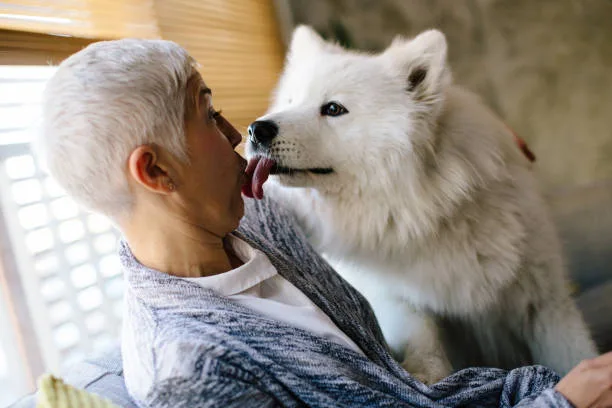
Hydration: A Key Component of Senior Husky Care
Ensuring proper hydration is a vital aspect of Senior Husky Care. As Huskies age, their bodies undergo changes that can affect their water balance and overall health.
Senior Huskies are more prone to dehydration due to a decrease in their ability to retain water and a reduced sense of thirst. Prospective owners should consider these factors and take proactive measures to ensure their senior Husky stays adequately hydrated.
Providing access to clean and fresh water at all times is crucial. Owners should monitor their pet’s water intake and encourage regular consumption, especially during warmer weather or after physical activity.
Additionally, incorporating wet food into the senior Husky’s diet can contribute to their overall fluid intake and help prevent dehydration. It’s essential for owners to be mindful of signs of dehydration such as dry gums, lethargy, or sunken eyes, and seek veterinary care promptly if these symptoms are observed.
Proper hydration plays a key role in maintaining the health and well-being of senior Huskies, and by being proactive, prospective owners can ensure their pet remains healthy and happy in their golden years.
Reddit Senior Husky Diet and Nutrition Guide for Prospective Owners
Ensuring your senior Husky stays well-hydrated is crucial to their health and happiness. For additional insights into the intriguing world of Huskies, including their distinct facial expressions, delve into our fascinating article, Unraveling the Mystery Behind a Husky's Visage.
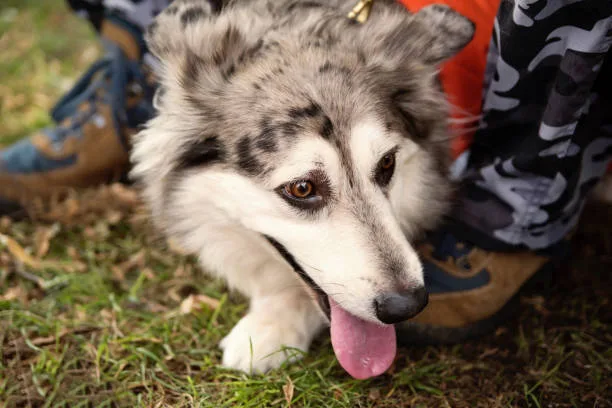
Specialized Diets for Senior Huskies with Medical Conditions
As Senior Huskies age, they may develop specific medical conditions that require specialized diets to manage their health effectively. For instance, kidney disease, diabetes, and heart problems are common issues in aging Huskies, and their dietary requirements need to be carefully tailored to support their overall well-being.
For Senior Huskies with kidney disease, a specialized diet that is low in phosphorus and high-quality protein while also being palatable is crucial. Similarly, for those with diabetes, a diet with controlled levels of complex carbohydrates and consistent levels of fiber can help manage blood sugar levels.
Additionally, Huskies with heart problems may benefit from a diet low in sodium and rich in omega-3 fatty acids to support heart function. It’s essential for prospective owners to be aware of these specialized dietary needs and work closely with a veterinarian to ensure their Senior Husky receives the appropriate nutrition for their specific medical conditions.
American Kennel Club: Senior Husky Diet and Nutrition Guide for Prospective Owners
Understanding the specific dietary requirements for Senior Huskies with medical conditions such as kidney disease, diabetes, or heart problems is crucial to support their overall well-being and manage their health effectively. Collaborating with a veterinarian to tailor a specialized diet based on the specific medical condition is essential for ensuring the Senior Husky’s nutritional needs are met.
Understanding the proper diet for managing your senior Husky's health issues is just the start. Discover more insights and positive training techniques for your furry companion by visiting positive training strategies to curb your Husky's biting habits.
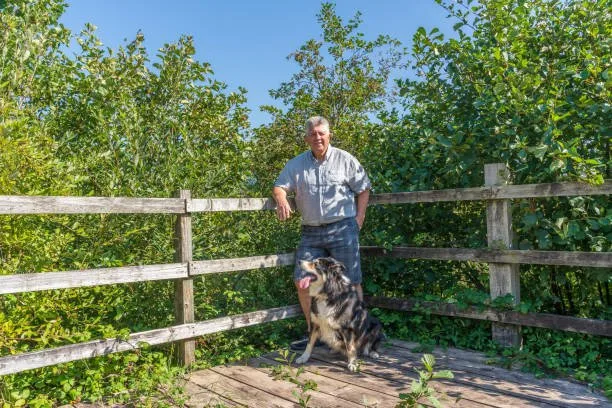
Considerations When Choosing Commercial Dog Food
When choosing commercial dog food for a senior Husky, it’s essential to prioritize the nutritional requirements specific to their age and health. Look for formulas that are specifically labeled for senior dogs, as they are tailored to address the needs of aging pets.
These formulas often contain lower calorie content to accommodate their decreased activity levels while ensuring they receive essential nutrients. Additionally, seek out products that include high-quality protein sources, such as real meat or meat meal, as well as healthy fats like Omega-3 fatty acids for joint health and overall well-being.
When evaluating options, carefully scrutinize the ingredient list to avoid fillers, artificial additives, and excessive preservatives. Prioritizing natural, recognizable ingredients will contribute to a more balanced and wholesome diet for your senior Husky.
On Quora about: Senior Husky Diet and Nutrition Guide for Prospective Owners
When selecting commercial dog food, it is crucial to consider the specific nutritional needs of a senior Husky.
Look for formulas designed for senior dogs, prioritizing high-quality protein sources, healthy fats, and natural ingredients. Avoid fillers, artificial additives, and excessive preservatives to ensure a balanced and wholesome diet for your aging pet.
As you consider the well-being of your senior Husky, exploring interspecies relationships can also contribute to their quality of life. Gain insight into the intriguing dynamics between dogs and other pets by reading our article, Unveiling the Compatibility of Labradors and Cats.

Homemade Meals: Pros and Cons for Senior Huskies
Preparing homemade meals for a Senior Husky can have both advantages and disadvantages. One of the key benefits is having full control over the ingredients, which allows you to cater to your dog’s specific nutritional needs.
This level of control is particularly useful if your senior Husky has specific dietary requirements or allergies. Additionally, preparing meals at home can provide a sense of satisfaction and bonding between you and your pet, knowing exactly what they are consuming.
However, the potential drawbacks of homemade meals include the need for careful meal planning to ensure a balanced and complete diet. Without proper knowledge, there may be a risk of nutritional imbalances or deficiencies, which can impact your senior Husky’s health.
Moreover, preparing homemade meals may be time-consuming and require diligent adherence to safe food handling practices to prevent contamination. Senior Husky Diet and Nutrition Guide for Prospective Owners must weigh these pros and cons when considering homemade meals to ensure the best possible care for their pet.
Ultimately, the decision between feeding commercial dog food or homemade meals should be based on thorough research and consultation with a veterinarian to ensure that the senior Husky receives a diet that meets their specific nutritional needs.
To ensure your senior Husky enjoys a wholesome diet tailored to its unique needs, we invite you to delve deeper into the intricacies of canine nutrition. Uncover further insights by exploring our comprehensive guide on the subject, aptly titled The Mythical World of Canine Culinary Arts.

Transitioning Your Husky to a Senior Diet
Transitioning your Husky to a senior diet can significantly impact their health and well-being. It’s crucial to make this change gradually and thoughtfully to prevent any digestive issues or discomfort for your pet.
Start by consulting with your veterinarian to assess your Husky’s current health status and determine the appropriate timing for transitioning to a senior diet. As a general guideline, it’s best to start this process when your Husky reaches around 7 years of age.
However, individual dogs may have different needs, so professional guidance is essential. Additionally, when making the switch, slowly incorporate the new senior diet into your Husky’s meals while gradually reducing the amount of their previous food.
This gradual transition allows the digestive system to adapt smoothly without causing any undue stress. By following this approach, you can help your Senior Husky adjust comfortably to their new diet, supporting their long-term health and happiness.
Remember to monitor your Husky’s response to the new diet and make adjustments as necessary based on their digestion and overall well-being.
Consistency and patience during this transition period are key to ensuring a successful shift to a senior diet for your beloved pet.
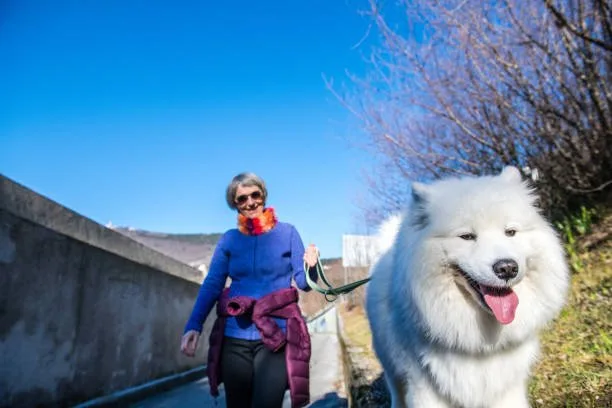
Feeding Frequency and Portion Control for Senior Huskies
As a Senior Husky Diet and Nutrition Guide for Prospective Owners, it’s essential to understand the adjustments needed in feeding frequency and portion sizes for aging Huskies. Senior Huskies experience changes in metabolism, which can impact their dietary requirements.
To accommodate these changes, it’s important to consider feeding them smaller, more frequent meals throughout the day. This helps prevent overeating and supports their changing metabolic function.
Additionally, portion control becomes crucial to avoid excessive weight gain and maintain optimal body condition. By monitoring the portion sizes and adjusting the feeding frequency, prospective owners can effectively cater to the specific needs of their senior Huskies, ensuring their health and well-being in their golden years.
Feeding smaller, more frequent meals helps prevent overeating and supports the changing metabolic function in senior Huskies.
Monitoring portion sizes and adjusting feeding frequency is essential to prevent excessive weight gain and maintain optimal body condition.
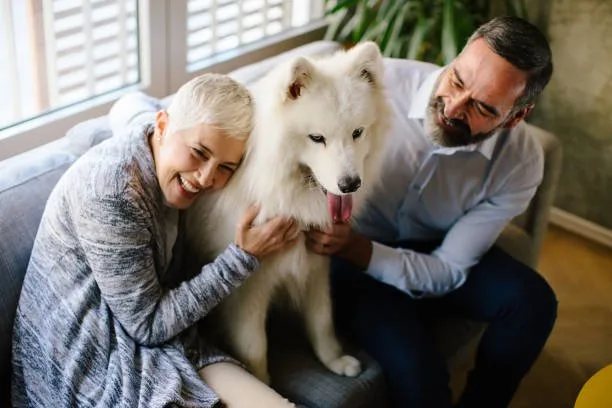
Common Dietary Problems and How to Avoid Them
Senior Husky Diet and Nutrition Guide for Prospective Owners addresses common dietary problems faced by aging Huskies and provides effective strategies to avoid them. Obesity is a prevalent issue among senior Huskies, often resulting from overfeeding and lack of physical activity.
To prevent obesity, it’s crucial to establish a consistent feeding routine, monitor portion sizes, and incorporate regular exercise into their daily routine. Additionally, nutrient deficiencies can arise in senior Huskies, particularly in essential vitamins and minerals.
To mitigate such deficiencies, owners should consider high-quality senior dog food formulas or consult with a veterinarian to incorporate necessary supplements into their pet’s diet. By proactively addressing these common dietary problems, prospective owners can ensure the health and well-being of their senior Huskies.
Moreover, it’s important to monitor the dog’s weight and adjust the diet accordingly to prevent excessive weight gain. This may involve selecting lower-calorie senior dog food formulas and keeping track of portion sizes to maintain an optimal weight.
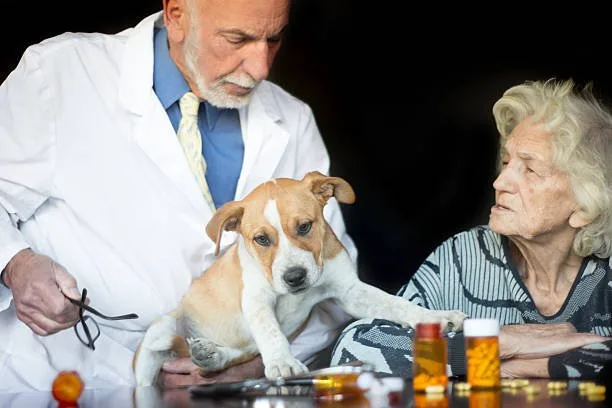
Creating an Effective Feeding Schedule for Senior Huskies
Establishing a consistent feeding schedule is crucial for meeting the specific energy requirements of senior Huskies, supporting their metabolic function, and preventing overfeeding. To achieve this, owners should consider the number of meals per day, timing, and adjustments based on the dog’s activity level and health status.
In order to meet the specific energy requirements of senior Huskies, a consistent feeding routine should be established.
It’s recommended to divide their daily food intake into two equal meals, given at the same time each day. This helps maintain stable energy levels and prevents overeating, which is particularly important for aging dogs with slower metabolisms.
Furthermore, the feeding schedule should be adjusted based on the dog’s activity level and health status.
For senior Huskies who are less active, portion control is vital to prevent weight gain. Conversely, more active senior Huskies may require an adjusted feeding schedule to support their higher energy needs.
Overall, by setting a consistent feeding routine and making necessary adjustments based on the individual dog’s needs, owners can effectively support the health and well-being of their senior Husky.

Optimizing Nutritional Intake for Senior Huskies
Optimizing the nutritional intake for senior Huskies requires a balanced combination of proteins, fats, and carbohydrates tailored to their specific needs. High-quality protein sources are essential for maintaining muscle mass and overall health in aging Huskies.
Omega-3 fatty acids play a crucial role in supporting joint health, reducing inflammation, and promoting a glossy coat. Additionally, a fiber-rich diet is beneficial for senior Huskies as it aids in digestion and helps prevent common digestive issues.

The Significance of Weight Management in Senior Huskies
Weight management is a crucial aspect of the Senior Husky Diet and Nutrition Guide for Prospective Owners. As huskies age, they may become more prone to obesity, which can have negative impacts on their overall health.
It’s essential for prospective owners to address this concern by implementing appropriate calorie intake and controlling food portion sizes as part of their senior husky’s diet plan. Additionally, considering lower-calorie senior dog food formulas can help in managing and preventing obesity.
Alongside dietary adjustments, integrating regular exercise into the husky’s routine is vital. This combination of a balanced diet and physical activity plays a key role in maintaining a healthy weight and promoting overall wellness for senior huskies.
Ensuring that senior huskies receive the right amount of calories and portion sizes is essential
- Implementing appropriate calorie intake is crucial to prevent obesity
- Controlling food portion sizes is important for weight management
- Considering lower-calorie senior dog food formulas can be beneficial
Regular exercise is vital in maintaining a healthy weight for senior huskies

Customizing Diets for Huskies with Special Health Needs
Senior Husky Diet and Nutrition Guide for Prospective Owners Aging Huskies with special health needs, such as diabetes or kidney issues, may require customized diets to support their specific medical conditions. In these cases, it is vital to work closely with a veterinarian to determine the appropriate nutritional plan tailored to the individual needs of the Husky.
For Huskies with diabetes, a diet low in simple carbohydrates and high in fiber may be recommended to help regulate blood sugar levels. Additionally, incorporating supplements like glucosamine and chondroitin can aid in maintaining joint health, especially for senior Huskies prone to arthritis or mobility issues.
Furthermore, it’s crucial to steer clear of common allergens and toxic foods that can exacerbate existing health problems in Huskies with specialized dietary requirements. By customizing their diets and carefully considering their specific health needs, prospective owners can effectively support the well-being of senior Huskies with special health conditions.
Overall, a customized diet is crucial to support the specific medical conditions of aging Huskies.
It involves working closely with a veterinarian to tailor the nutritional plan to the individual needs of the dog. For example, Huskies with diabetes may benefit from a diet low in simple carbohydrates and high in fiber to regulate blood sugar levels.
Additionally, incorporating supplements like glucosamine and chondroitin can aid in maintaining joint health for senior Huskies prone to arthritis or mobility issues.
- It is important to consider individual health needs and to avoid common allergens or toxic foods that can exacerbate existing health problems in Huskies with specialized dietary requirements.
- By customizing their diets and carefully considering their specific health needs, prospective owners can effectively support the well-being of senior Huskies with special health conditions.
.
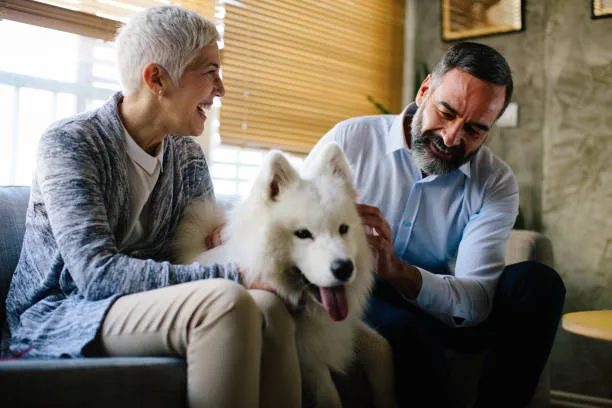
Feeding Choices: Commercial vs. Homemade Diets for Aging Huskies
When considering the dietary needs of senior Huskies, prospective owners often contemplate the choice between commercial diets and homemade meals. Both options have their own set of advantages and drawbacks, making it essential to weigh the factors that can significantly impact the health and wellness of aging Huskies.
- Commercial Diets:
- Advantages:
- Convenience and accessibility
- Nutritional balance and complete diet formulations
- Regulated quality standards
- Drawbacks:
- Potential for additives and preservatives
- Possibility of allergens or lower quality ingredients
- Less customization for specific health needs
- Advantages:
- Homemade Diets:
- Advantages:
- Control over ingredients and quality
- Potential for variety and freshness
- Opportunity to cater to specific dietary restrictions or preferences
- Drawbacks:
- Requires careful nutritional planning to ensure balance
- Potential for contamination and foodborne illnesses
- Need for additional supplementation to meet all nutritional requirements
- Advantages:
When making the decision between commercial and homemade diets for senior Huskies, it’s important to prioritize nutritional balance, food safety, and the inclusion of essential vitamins and supplements.
Additionally, both feeding options should be evaluated in terms of their potential impact on dental health and overall wellness in aging Huskies.
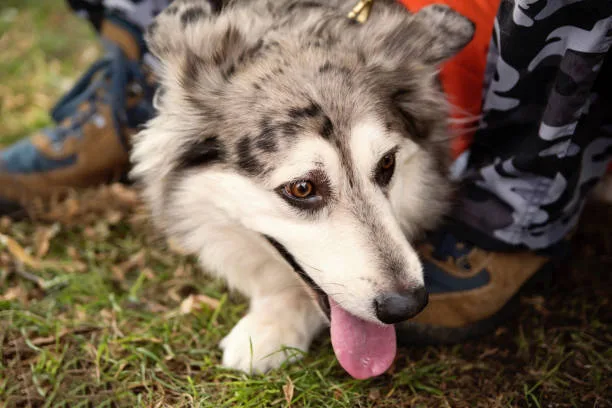
Conclusion: Ensuring a Balanced Diet for Your Senior Husky
Ensuring a balanced diet for your senior Husky is crucial for their overall health and well-being. As your dog enters their golden years, their nutritional needs undergo significant changes.
Paying attention to their diet can help maintain their energy levels, manage weight, and support their joint health. It’s important to provide a diet rich in high-quality protein sources, healthy fats, and essential carbohydrates.
Additionally, incorporating vitamins and supplements tailored to their age can further bolster their health. By considering their specific dietary requirements and crafting a well-balanced meal plan, you can help your senior Husky enjoy a comfortable and vibrant life.
Providing a balanced diet for your senior Husky is paramount for their health and happiness in their golden years.
As they age, their energy levels, weight management, and joint health become priorities, making it essential to focus on high-quality protein sources, healthy fats, and essential carbohydrates in their diet. Moreover, incorporating age-specific vitamins and supplements can further enhance their overall well-being.

Leave a Reply